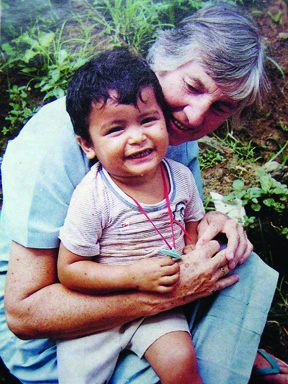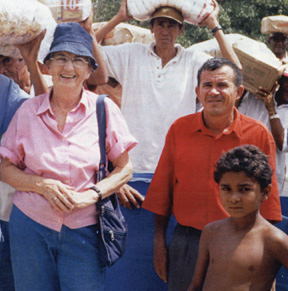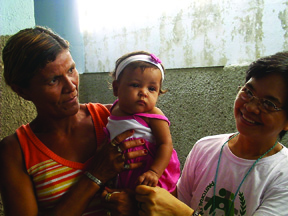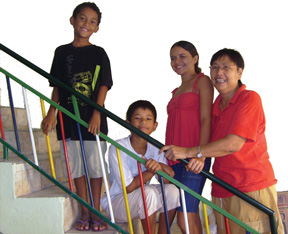Short Stories
March/April 2009
Return to Table of Contents
Print Article
Remembering friends
 Sr. Mary Hughes with four-year-old Paulo whom she met soon after she began working in the town of Mulungu in the interior of Brazil in the late 1970s.
Sr. Mary Hughes with four-year-old Paulo whom she met soon after she began working in the town of Mulungu in the interior of Brazil in the late 1970s.
By Sr. Mary Hughes, O.L.M.
My first overseas mission appointment was in 1967 to Fortaleza, Brazil, where I nursed at the University Maternity Hospital for 10 years. Our Lady's Missionaries then moved to the interior to work with Basic Christian Communities in the small town of Mulungu, 140 kilometres from Fortaleza. We lived in a parish house and did home visitations in the community.
It was on one such visit that I met Maria, a woman with a very bad heart condition. Her youngest son Paulo, four years old, became my friend. On the occasions when Maria had to be taken to the hospital, Paulo would cry and beg me not to take his mother away. Each time, I would try to explain to him why it was necessary and how much it would help her. It was a difficult time for mother and son.
In 1989, our mission community moved back to Fortaleza and I never saw my little friend Paulo again. I continued my ministry of visiting the sick, especially AIDS patients in Sao Jos. Hospital. Many of these patients were poor and lived very far from their families. As a result they were unable to see their loved ones very often. I felt it a privilege to be near them in their lonely times, to pray with them, and to try to be of any help I could.
Now that I am back in Canada, I often think of Paulo and the many friends I met in my 40 years of mission to Brazil. I pray for them and thank God I was able to assist them in their time of sickness.
Quest for land
An update submitted by Sr. Clarice Garvey, O.L.M.
 Sr. Clarice Garvey with members of a group of landless farmers and their families who have been struggling for years to gain ownership of land in Brazil.
Sr. Clarice Garvey with members of a group of landless farmers and their families who have been struggling for years to gain ownership of land in Brazil.
One year ago, as we were preparing our stories for Scarboro Missions' May-June 2008 special issue on Our Lady's Missionaries, the word came down from the Brazilian government's Department of Agrarian Reform that the families who had camped on the roadside for more than two years, hoping to become occupants of a nearby farm, were denied entry to this land. After endless meetings with government agents in their two-year quest for land, they were informed that all negotiations with the landowner had ceased. With the courage that only people of great faith and conviction have, they divided into three smaller groups, each moving separately to other areas and continued their negotiations with the government. During all this time they never ceased to plant and harvest, and to sell their produce, no matter how small the strip of land available to them.
They are still displaced, but the legal processes that will give them the right to the land are now well advanced and their right to these lands confirmed. With this good news, there are three wonderful celebrations of thanksgiving in the offing; celebrations like only Brazilians know how to put on. There are many groups of landless families camped throughout Brazil. Over the years, agrarian reform has not been a priority of any Brazilian government. It is regretful that President Lula's government has not chosen to be an exception.
Lucy's celebration
By Clarice Garvey, O.L.M.
For some years now Brazil has been known as one of the countries to have carried out advanced research in the area of treatment and care for people with HIV/AIDS. In Fortaleza, a group of Brazilian Sisters operates the Centro de Conviv.ncia, a highly integrated day-care service to individuals as well as to their children. People are given the opportunity to continue their ordinary education, as well as take courses in various types of crafts that they could make and sell in order to earn a living.
In November 2008, the Centro de Convivência celebrated 15 years of service to the people of Fortaleza and among those awarded for their contribution to the excellent reputation of the Centre was our Sr. Lucy Lee. Our Lady's Missionaries in Brazil are proud to have one of our members involved in this ministry to people who are so often excluded and ostracized. Their gentle acceptance teaches us the importance of living each day for its own beauty, and the healing power of a pleasant smile and a kind word is part of that everyday beauty.
Sr. Lucia Lee entered Our Lady's Missionaries in 1978 and first went to Brazil in 1995.
The World Social Forum
The annual World Social Forum was once again held in January in Brazil, this time in Belém, in the state of Pará. This Forum, organized nine years ago, is a counterpoint to the annual World Economic Forum held in Davos, Switzerland. Since its beginning in Porto Alegre in the state of Rio Grande do Sul, Brazil, the World Social Forum has been held in several countries, always with the same theme, "A Better World is Possible", and continues to sow seeds of hope and excitement in all who participate.
According to Candido Grzybowski, the director of the Brazilian Institute for Social Analysis, the present international crisis in the economy and the breakdown of the current model of economic development makes Davos look like a cemetery of the hopeless in comparison to the event in Belem, which is developing possibilities for huge changes in terms of social and economic equality.
Our Lady's Missionary Sr. Yolanda Cadavos attended the 2009 Forum as a member of the Archdiocese of Fortaleza's Pastoral for the Protection of Children and Women Against Trafficking. Sr. Cadavos was impressed with the numbers of people from so many countries with the same concerns and hopes.
The joy of sharing
By Sr. Lucia Lee, O.L.M.
A few days before Christmas I asked Antônia, the coordinator at the children's library, if they were going to have a Christmas party. She said that because there was no money available it was not likely that they would. The library is one of the "Little Libraries" started by Canadians Ben and Doreen Wicks to promote the importance of education and to provide an opportunity for children in the community to learn to read and write.
I offered to provide snacks for the children if Ant.nia would organize a small party. She was grateful for my offer because the children had spoken to her about a party and made it very clear that they wanted the opportunity to exchange gifts "like big folks do."
With this strong plea from the children, Antônia went to the parents and asked them if they would each donate 50 centavos (about 25 cents) for a Christmas party. They agreed.
On the day of the party, the library was nicely decorated in Christmas style. On one side of the room was a table with many small baskets made by the children from plastic pop bottles. Each basket contained two candies, a small bag of popcorn, and a piece of cake. In the middle of the room was a Christmas tree with 30 gifts beneath it, all wrapped in shiny Christmas paper and green ribbons. Around the tree sat 30 excited children, waiting to see what was in all those presents.
The party began with everyone singing Christmas carols, and this year because a German student is doing fieldwork at the library and likes to practice English, the children were taught to sing Silent Night in English, the universal language. Next came the gift-opening.
When the children arrived they had each received a small paper on which was written the name of a companion. Now, one at a time, they called out the name of their secret friend and then pranced over to present him or her with a gift. The more outgoing givers were free-spirited enough to try to kiss the receiver, as adults do, but for the shier ones, the presentation was more discreet.
The excitement reached its peak when all had received their presents and opened them. The fact that each present was exactly like the other took nothing from the joy of having a secret friend with whom one could exchange a gift at Christmas. The delight of the moment made even the few treats in the baskets seem like a feast. Oh the joy of Christmas.
Return to Table of Contents
Print Article

